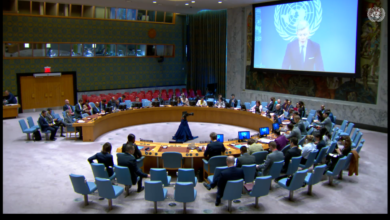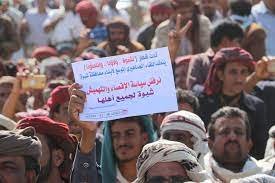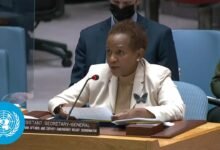Washington mulls increasing pressure on Yemen’s Houthis

SMA NEWS – Riyadh
Well-informed Yemeni sources said on Friday that the coming days will be marked by increased Western pressure on the Iran-aligned Houthi militias to accept a UN peace plan, supported by international players and approved by the Yemeni government and the Arab coalition.
The sources, who spoke on condition of anonymity, indicated that pressure on the Houthis could include a plan to block funding and military assistance from Iran. Houthis, the sources added, could find themselves officially blamed for the failure of peace efforts in Yemen.
The UN is reportedly planning to make minor amendments to the ceasefire agreement, following criticism by the Houthis who want to include the humanitarian aspect into any military or political deal.
The US envoy Tim Lenderking and the outgoing UN envoy Martin Griffiths have recently visited the Saudi capital, Riyadh and met Saudi and Yemeni officials to discuss peace efforts, according to official Yemeni and Saudi media.
The Yemeni Prime Minister Maeen Abdul-Malik received at his residence in Riyadh on Wednesday, the US special envoy to Yemen, who briefed him, according to the official Yemeni news agency SABA, on “the results of the moves to bring peace in Yemen and the visions of the international community to put an end to the Houthi militia’s continued refusal and intransigence towards all proposed initiatives and solutions.”
Meanwhikle Lenderking met the Saudi ambassador to Yemen Muhammad al-Jaber. The two sides reportedly discussed “international efforts and moves to secure a ceasefire in Yemen.”
On Thursday, Yemen’s Foreign Minister Ahmed Awad bin Mubarak met the US envoy. The two sides discussed “Houthi militia’s refusal to agree to a comprehensive cease-fire, reopen Sanaa airport and guarantee the supply of oil derivatives’ revenues to pay employees’ salaries.”
Bin Mubarak said, “the militias’ targeting of civilians and populated areas in Marib with ballistic missiles has not stopped, but rather increased in severity, which exacerbates the seriousness of the humanitarian situation, increases the number of civilian casualties and undermines international efforts to establish peace.”
The Saudi ambassador also praised the US decision to impose sanctions against a Yemeni network that it claims was cooperating with Iran’s Revolutionary Guard to illicitly transfer tens of millions of dollars to Yemen’s Houthi militias.
He noted that the only way to reach lasting and comprehensive peace is to end Iranian meddling and counter Houthis’ aggression against the Yemeni people.
Trips by UN and US envoys to Riyadh came in the wake of a recent flurry of international and regional diplomatic activity, which culminated in the visit of a delegation from the Omani royal office to Sana’a and a meeting with Houthi leaders, including the militias’ leader Abdul-Malik al-Houthi and head of the Supreme Political Council Mahdi al-Mashat. The encounter, sources said, aimed at pushing the Houthis to accept the final blueprint of the ceasefire plan.
Yemeni sources had earlier revealed to The Arab Weekly that the Omani delegation had left Sana’a without making any progress after the Houthis rejected the UN plan and insisted on moving ahead purely with arrangements for opening the Sana’a airport and Hodeidah. The Houthis, the sources said, postponed discussions of the ceasefire deal and all related issues, including their ongoing offensive to seize the strategic city of Marib and their attacks on Saudi lands.
Marib is emerging as a key issue on the map of the current conflict in Yemen, with the Houthis insisting on seizing the city and turning a deaf ear to all international and UN calls to stop their violent offensive. The Houthis military assault has so far caused dozens of deaths and injuries among civilians. In recent weeks, the militias have intensified their missile attacks on crowded neighbourhoods, targeting displaced people and civilians.
Observers believe the confusion of the international community has been one of the main factors that led to the failure of efforts to reach a ceasefire in Yemen. The Houthis, observers say, are still hoping to achieve more military gains, in the absence of any international action that could diminish their clout.
Experts in Yemeni affairs have noted a shift in Western positions during the past few years. They say recent European and American statements have echoed a sense of frustration with the Houthis and signalled some sort of readiness to exert increased pressure on the militias over their rejection of the proposed peace options.
Experts believe that a tougher international stance against the Houthis will likely build up in the long run. Meanwhile, the militias will exploit the current international inaction and buy time to achieve their military goals. They will eventually accept a ceasefire formula that enshrines a number of gains they have made over the past few years. Then, the Houthis will once again resume political manoeuvring through the signing of agreements but not committing to their terms.
Yemeni political researcher Abd al-Wahhab Buhaibah noted the Houthis represent an ideological movement that views peace from the perspective of the opponent’s surrender, especially since they control strategic areas in northern Yemen, the most important of which are Sana’a and Hodeidah.
In a statement to The Arab Weekly, Buhaibeh noted that the Houthi militias could eventually yield to international pressure and engage in negotiations, but in line with their objectives and in a way that achieves a full political recognition of their influence. Such intransigence could lead to a deadlock that could not be resolved through dialogue.
“The issue is very complicated, as the Houthis are speaking from a religious standpoint and not a political one. They introduce themselves as the rulers, according to a sacred religious text and this very idea undermines the essence of any peace process,” Buhaibeh said, noting that “the holder of such an arrogant thought cannot accept any peace or coexistence.”
“Achieving lasting peace will not be possible unless there is a legitimate military force that imposes its control on the Yemeni capital, Sana’a and Hodeidah and counters the Houthis’ influence in those strategic areas. That force will become the pillar of permanent peace and it will compel the Houthis to surrender,” Buhaibeh added.








